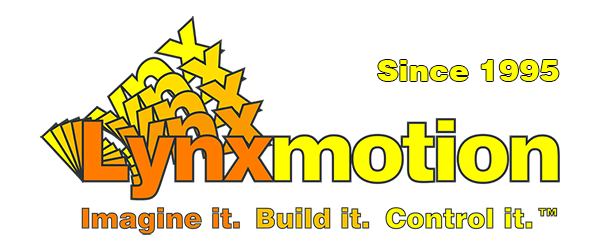Changes for page LSS Communication Protocol
Last modified by Eric Nantel on 2025/06/06 07:47
Change comment: There is no comment for this version
Summary
-
Page properties (2 modified, 0 added, 0 removed)
Details
- Page properties
-
- Author
-
... ... @@ -1,1 +1,1 @@ 1 -xwiki:XWiki. RB11 +xwiki:XWiki.CBenson - Content
-
... ... @@ -42,28 +42,6 @@ 42 42 Modified commands are command specific. 43 43 ))) 44 44 45 -((( 46 - 47 -))) 48 - 49 -== Configuration Commands == 50 - 51 -Configuration commands affect the servo's current session* but unlike action commands, configuration commands are written to EEPROM and are retained even if the servo loses power (therefore NOT session specific). Not all action commands have a corresponding configuration and vice versa. Certain configurations are retained for when the servo is used in RC model. More information can be found on the [[LSS - RC PWM page>>doc:Lynxmotion Smart Servos (LSS).LSS - RC PWM.WebHome]]. 52 - 53 -1. Start with a number sign # (U+0023) 54 -1. Servo ID number as an integer 55 -1. Configuration command (two to three letters, no spaces, capital or lower case) 56 -1. Configuration value in the correct units with no decimal 57 -1. End with a control / carriage return '<cr>' 58 - 59 -Ex: #5CO-50<cr> 60 - 61 -Assigns an absolute origin offset of -5.0 degrees (with respect to factory origin) to servo #5 and changes the offset for that session to -5.0 degrees. 62 - 63 -Configuration commands are not cumulative, in that if two configurations are sent at any time, only the last configuration is used and stored. 64 - 65 -*Important Note: the one exception is the baud rate - the servo's current session retains the given baud rate. The new baud rate will only be in place when the servo is power cycled. 66 - 67 67 == Query Commands == 68 68 69 69 Query commands are sent serially to the servo's Rx pin and must be set in the following format: ... ... @@ -91,21 +91,25 @@ 91 91 ))) 92 92 93 93 Indicates that servo #5 is currently at 144.3 degrees. 72 +))) 94 94 95 - **SessionvsConfigurationQuery**74 +== Configuration Commands == 96 96 97 - Bydefault,thequerycommand returns the sessions'value;shouldnoaction commands havebeensenttochange,itwillreturn thevalue saved inEEPROMfromthelast configurationcommand.76 +Configuration commands affect the servo's current session* but unlike action commands, configuration commands are written to EEPROM and are retained even if the servo loses power (therefore NOT session specific). Not all action commands have a corresponding configuration and vice versa. Certain configurations are retained for when the servo is used in RC model. More information can be found on the [[LSS - RC PWM page>>doc:Lynxmotion Smart Servos (LSS).LSS - RC PWM.WebHome]]. 98 98 99 -In order to query the value in EEPROM, add a '1' to the query command. 78 +1. Start with a number sign # (U+0023) 79 +1. Servo ID number as an integer 80 +1. Configuration command (two to three letters, no spaces, capital or lower case) 81 +1. Configuration value in the correct units with no decimal 82 +1. End with a control / carriage return '<cr>' 100 100 101 -Ex: #5C SR20<cr>sets the maximum speed for servo #5 to 20rpm upon RESET (explained below).84 +Ex: #5CO-50<cr> 102 102 103 -A fterRESET:#5SR4<cr>sets the session'sspeedto4rpm.86 +Assigns an absolute origin offset of -5.0 degrees (with respect to factory origin) to servo #5 and changes the offset for that session to -5.0 degrees. 104 104 105 - #5QSR<cr>would return*5QSR4<cr>whichrepresentsthevalueforthat session.88 +Configuration commands are not cumulative, in that if two configurations are sent at any time, only the last configuration is used and stored. 106 106 107 -#5QSR1<cr> would return *5QSR20<cr> which represents the value in EEPROM 108 -))) 90 +*Important Note: the one exception is the baud rate - the servo's current session retains the given baud rate. The new baud rate will only be in place when the servo is power cycled. 109 109 110 110 = Command List = 111 111 ... ... @@ -361,7 +361,7 @@ 361 361 362 362 __17. Identification Number__ 363 363 364 -A servo's identification number cannot be set "on the fly" and must be configured via the CID command described below. The factory default ID number for all servos is 0. Since smart servos are intended to be daisy chained, in order to respond differently from one another, the user must set different identification numbers. Servos with the same ID and baud rate will all receive and react to the same commands.346 +A servo's identification number cannot be set "on the fly" and must be configured via the CID command described below. The factory default ID number for all servos is 1. Since smart servos are intended to be daisy chained, in order to respond differently from one another, the user must set different identification numbers. Servos with the same ID and baud rate will all receive and react to the same commands. 365 365 366 366 Query Identification (**QID**) 367 367

